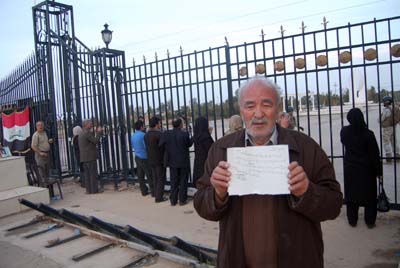Do U.S. families have greater rights to visit children than Iranian families?
I read in a number of newspapers, that the Iranian government decided to approve the visas for three American families to visit their children, who had been arrested inside Iranian territory on charges of illegal entry.
 |
| Demanding a simple visit to his captive son |
… The dialogue that took place between Iranian and U.S. sides which resulted in the Iranians’ approval to allow these families to visit their three children must, for those following this story, focus attention on facts and issues that are linked to each other. Among the most important thing being that the charges levelled at the regime of Iran by the Americans are that it is a totalitarian dictatorial regime which is, as well, doing all in its power to covertly possess nuclear capability, and that Iran is a state sponsor of terrorism. I am not, here, …dwelling on the charges made against Iran. In addition I am not obliged to defend this country. But the truth must be stated within the framework of logic and objectivity. When we talk about rights and subject them to evaluation, we are going to find that what distinguishes this man from the other one is based on their proximity to the hearts of the people. And this is undoubtedly true of Iran and its neighbours. The relationship of Iran to its credit is that while Iraq was still going through many crises, what will determine the nature of their relationship in the future, is the position as to whether they [Iraqis] were Arabs or Muslims, or human beings.
It is known that the MKO, which is notorious in the international community as a terrorist organization, is now outside the authority of the Iraqi government. And this strengthens the view of those whose voices have grown to hold them accountable for activities and crimes committed against our people…
But the Iraqi government has not succeeded yet in its demand that the group leave Iraqi territory, despite the fact that what would achieve justice is that the criminals in the organisation, whose hands are stained with the blood of our people, be held accountable before leaving Iraqi land.
What is happening inside this organization is that those …whose conscience urges them to want to meet their families and loved ones, who are led to rise up in a revolt against their leaders and try to break free from the group’s values and objectives which are based on a desperate fascist hatred, are arrested and imprisoned and suffer woe and destruction.
And when I tried to visit these people, following a large body of news about the suffering of its people under the penalty of the dictatorship of the Mojahedin, my visit was met by the face dark and abusive behaviour of the Mojahedin leaders at the Camp Ashraf garrison, and the families, facing the walls of humiliation and shame and confusion created by them, failed to achieve their goal, which was to see their children.
These families staged a sit-in four months ago, in front of the notorious camp in Diyala province. They have asked the United States Ambassador Christopher Hill to intervene and pressure the leaders of the organization and its officials to end their suffering and find a solution meeting their children.
This reinforces the fact that the Iraqi government does not have the resolution to rein in the Mojahedin, and this has directed these families to writing an open letter to Hill, urging him to speed up the intervention and end this suffering.
The United States of America… asked for American citizens to visit their children who were arrested inside Iran on charges of illegal entry, and Iran allowed them to do so. The U.S. is called upon today to take a humanistic counterpart to the situation of Iran and to get the Mojahedin organization to lift the injustice against those who are detained inside the garrison and let their families and meet with them. But, how far is the one situation from the other?
Kazem Sami Farag,Baghdad

